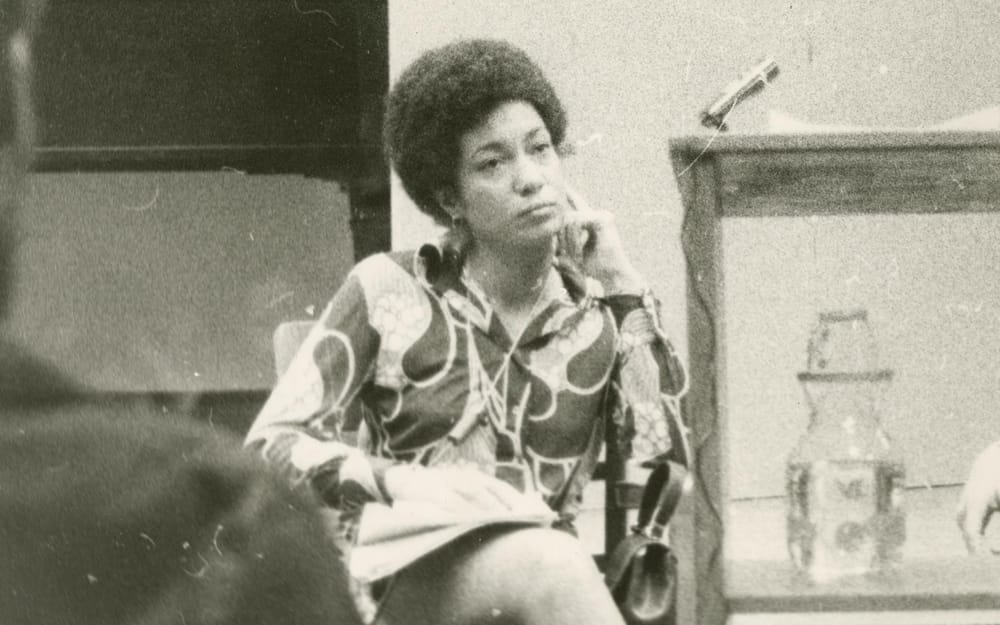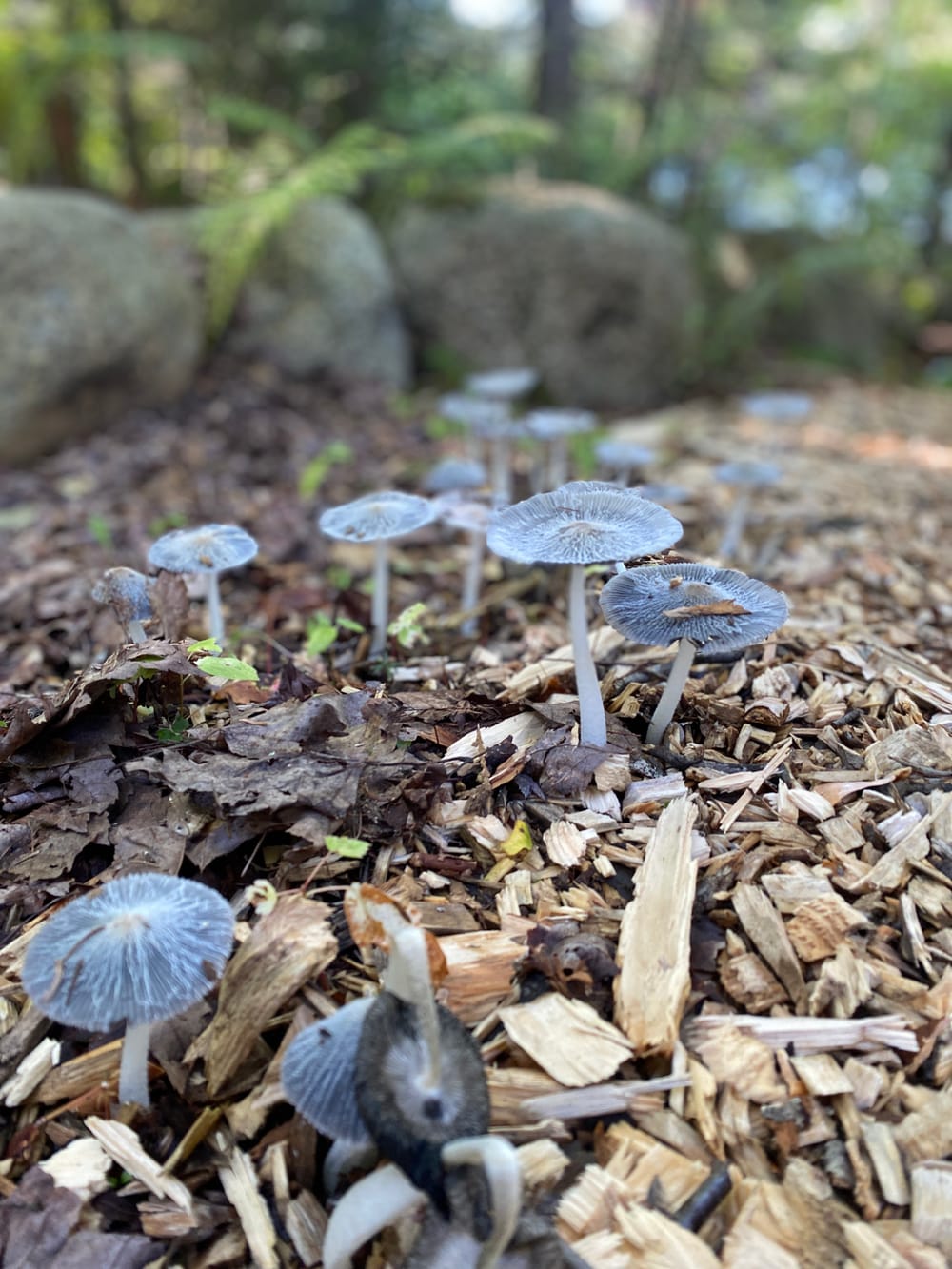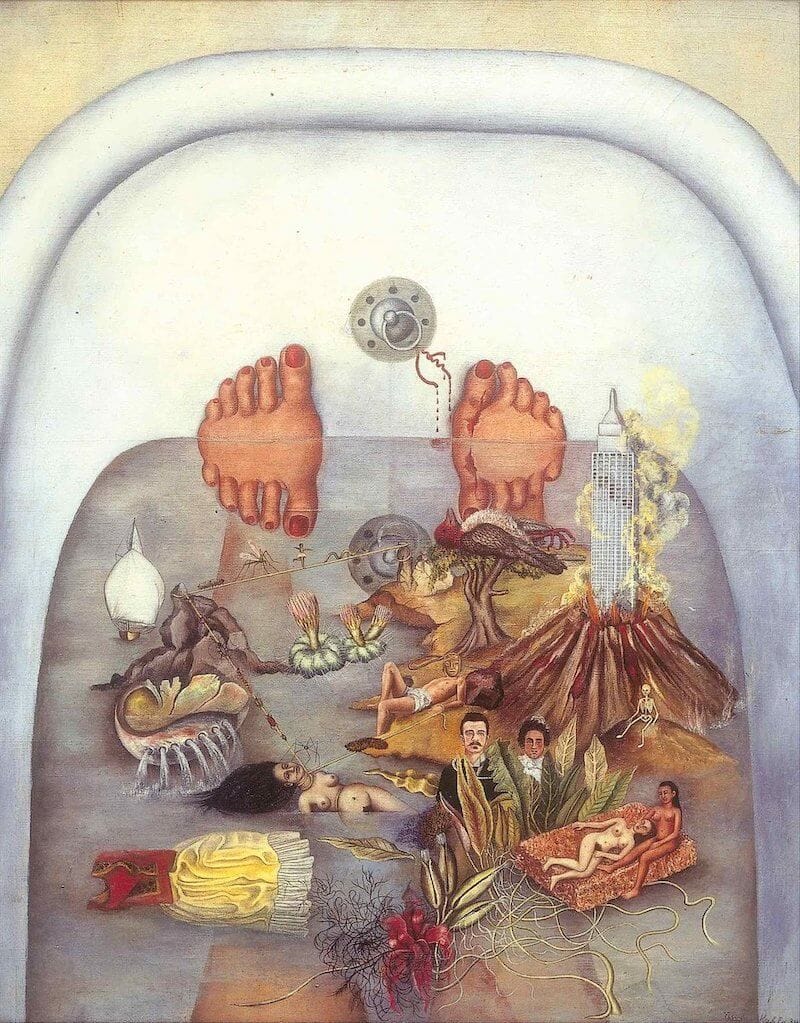Friends, welcome to a strange new season of the Missing Witches podcast. Usually here at the Fall Equinox we go looking for the witches we’ve been missing, but this summer I was diagnosed with stage 3 invasive breast cancer, and Amy had her land wash away in a flood leaving a crumbling wound, and we find ourselves on a precipice.
We’re here, and we come bearing true stories; but we can’t guarantee what shapes they’ll take.
I’ve started us off with a miniature Cancer season, episodes drawn from elements.
I began with Water and continued with Earth. Today we’re on Fire. This will be the last in this mini Cancer season for now, I’ll pass the torch to Amy while I walk the rest of the chemo path and see you on the other side.
Before I begin, many of you have kindly asked how to support us. Amy and I dream and labour to make a living through our Missing Witches work, so here are a few ways to help:
- Click Join the Coven and become a supporting member.
- Visit our Shop and grab some merch - we have a new Bless This Chest mini collection created with protection magic for all our changes and transitions.
- Order our books or Oracle deck from Bookshop, Amazon, or your local witch shop.
- Free ways to help: review our books or podcast on Apple or Amazon, or simply share our work with people who might love it.
Your support means everything, thank you infinitely.
Ok, awkward detour over. Though it’s there always isn’t it? Keeping the flame alive.
Today let’s follow that fire. Walking ahead of us here, carrying a torch through the dark is June Jordan.
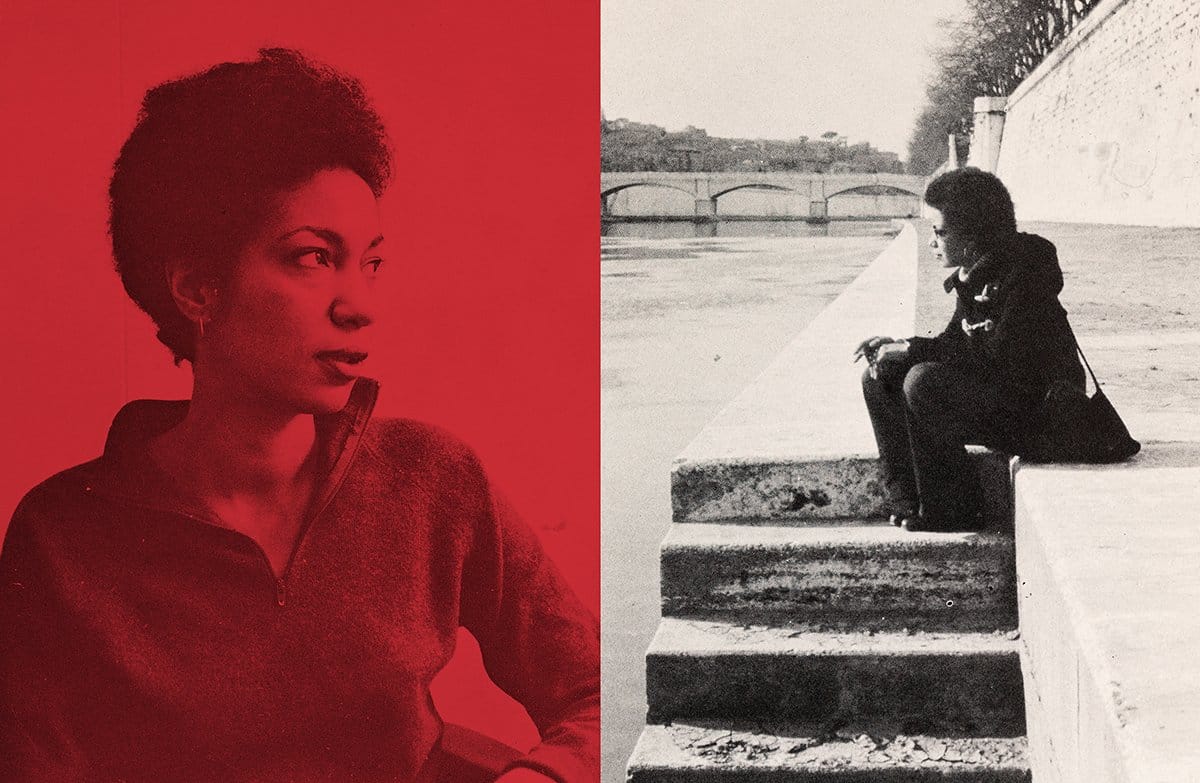
In 2023, Sriram Shamasunder, founder of HEAL, an organization that trains frontline health workers from countries around the world, including Indigenous communities in the United States, wrote,
I entered the University of California, Berkeley, as a freshman, a child of Indian immigrants, keeping my head down and taking primarily science classes. To fill a humanities requirement, I meandered into a class called Poetry for the People, a course taught and conceived by June Jordan, the great poet and activist…
In one of our last classes, a teaching assistant publicly accused June—in front of a class of 250 to 300—of failing to stand up on behalf of Palestinian people. She didn’t show up for class the following week.
The weekend after, I went over to her house in North Berkeley. She was surprised to see me, but she let me in. The morning sun lit up the kitchen and made specks of dust visible. We all knew she had breast cancer, but we didn’t know the extent of her struggle. About 20 bottles of medications were laid out on the kitchen counter—to treat cancer and fight nausea and pain.
We sat at her kitchen table. I tried to find the words to encourage her to come back to class. I stumbled as I tried to convey that the whole class knew of her commitment to the Palestinian struggle. June remained unmoved. She was worn down. (...)
She began to talk. She said her entire career had been brought to a halt in 1982 by the political stance she took in The Village Voice when she wrote a poem titled “Apologies to All the People in Lebanon” about the Israeli military’s massacre of Palestinians in the refugee camps in Sabra and Shatila…
June paid significantly for taking a pro-Palestinian stand... her bibliography shows a gap between the mid-’80s and mid-’90s (when) publishers refused to work with her.
That afternoon in her sunlit kitchen, I listened to her.
Jordan died of breast cancer at her home in Berkeley, California, on June 14, 2002, aged 65.
In Apologies to All the People in Lebanon she wrote:
They told you to go.
One hundred and thirty-five thousand
Palestinians in Beirut and why
didn’t you take the hint?
Go!
There was the Mediterranean: You
could walk into the water and stay
there.
What was the problem?
I didn’t know and nobody told me and what
could I do or say, anyway?
Yes, I did know it was the money I earned as a poet that paid
for the bombs and the planes and the tanks
that they used to massacre your family
But I am not an evil person
The people of my country aren't so bad
You can expect but so much
from those of us who have to pay taxes and watch
American TV
You see my point;
I’m sorry.
I really am sorry.
In 1982 in an Open Letter to Adrienne Rich, Jordan wrote:
I claim responsibility for the Israeli crimes against humanity, because I am an American and American monies made these atrocities possible… I believe that you cannot claim a people and not assume responsibility for what that people do or don’t do. You cannot claim to be human and not assume responsibility for the value of all human life.
June Jordan burned. With injustice, with heart ache, with rage, with luminosity and passion. When the cancer came to her breasts she was an ember burning to stay alive. Though exhausted, till the end she burned with love.
After the Harlem Riots of 1964, Jordan found that she was, in her words, "filled with hatred for everything and everyone white." She wrote in Civil Wars:
... it came to me that this condition, if it lasted, would mean that I had lost the point: not to resemble my enemies, not to dwarf my world, not to lose my willingness and ability to love.
She told Sriram Shamasunder,
...about her friendship with Fannie Lou Hamer, the great civil rights leader who put her body on the line to register Black folks to vote throughout the South. June at the time had a deep aversion to all white people—a hatred, even. Hamer apparently said to Jordan, “Ain’t no way, no how you can hate anyone and hope to see the face of God.” That shifted her. She realized it was that bedrock belief that enabled Hamer to face vicious threats and murderous hate and respond with love—first and foremost for her own salvation.
When I was in bed recovering from the bilateral mastectomy and the wounds still burned across my chest, my college friend who carries the name of the ancient healing flower Yarrow sent me a small silver medallion which had the elephant god of beginnings etched on one side and on the other the words “I am the flame above the beauty in the fields.” When Marc saw it he said, what, like the Sun? But I don’t think so, not exactly. My friend wrote “I wanted to send you something that called on the healing voices that I hold close - the Christian roots that I never quite managed to uproot and the Hinduism that both gave me respite in my teens and is a part of my son’s heritage. Sending you Hildegarde’s ferocious luminosity + Ganesha’s fortune and prosperity.”
“I am the flame above the beauty in the fields.”
Hildegarde von Bingen
Poppies and sunflowers, goldenrod and yarrow, had shown up in every waitingroom, all the different hospitals and staging rooms on the way to surgery. Even the social worker’s office where I went when I froze in rage and terror and panic and couldn’t do basic things like follow up with the oncologist that I’d been referred to — after the first oncologist I’d been referred to by my surgeon wouldn’t take me because I was out of area — and the social worker made calls for me, followed down the lines of broken telephone, figured out that the faxed referral had arrived missing crucial pages, caught me just as I was about to fall through the cracks, got me in to see them and to start my chemo the very next week. Even her office had them: Hallucinatory and revelatory, hot red, white and yellow flowers, always slightly out of focus, always looking like the flowering itself were fire.
Something loving and alive just above the blooms.
I think that’s what that channeled message from Hildegarde von Bingen means. Love, spirit, god if you like, is that flame above the beauty in fields, the poppies and sunflowers of every room I went into in those cancer days, the yarrow and goldenrod that riot in my untended gardens.
Love is the sustaining fire, the other side of the lemniscate from rage.
Love logic screams and whispers: terror has never made fewer terrorists, two million people displaced are not becoming less radicalized, because it’s 40 years after June Jordan wrote that and here we are again, with apologies to Lebanon, and both sides, all sides, all beings, need their gardens and their grandmothers, need ancient trees, need to stop living in a terrified state if their rage is ever going to come out the other side where we can meet again.
In The Care Manifesto, by The Care Collective including Andreas Chatzidakis, Jamie Hakim, Jo Littler, Catherine Rottenberg, and Lynne Segal, the authors wrote:
In this manifesto, we argue that we are in urgent need of a politics that puts care front and centre. By care, however, we not only mean ‘hands-on’ care, or the work people do when directly looking after the physical and emotional needs of others - critical and urgent as this dimension of caring remains. ‘Care’ is also a social capacity and activity involving the nurturing of all that is necessary for the welfare and flourishing of life. Above all, to put care centre stage means recognizing and embracing our interdependencies.
I’m sorry these epistles are more fragmented now. I’m rubbing my head as I write, trying to remember the thread, and hair is showering down on the keyboard and coating my fingers. After my first round of chemo, 3 days later my mother was caring for my kiddo but in a fractured-mind, anxious, panic state accidentally gave her a cup of poison. She thought she was giving her oat milk but she gave her cow milk instead and we spent the day in the emergency room, it took two epipens and a shot of cortisol to get her stable.
One week later we were back in the emergency room as I doubled over, grey with pain, and found out I needed my appendicitis out. 4 days after I got home from that surgery, all blown up like a balloon from the CO2 they fill you with for laparoscopic surgery, the day I was supposed to watch out for fever or increased pain that would indicate an internal infection which, despite the triple dose of antibiotics, I was more susceptible to having my white blood cells temporarily decimated by chemo, I got my period and my hair suddenly started to fall out all over my breakfast plate. May pulled out at clump and cheered “the medicine is working!” The next day we made a bonfire and May and the neighbourhood kids swam in the lake, and we quietly marked the equinox, the balance day.
We asked the dark to protect us as it came hushing in. The kids walked the paths with all the dried flowers I had gathered in the spring to make a summer tea I’d envisioned drinking all winter, but no loose teas allowed on chemo because of the risk of bacterial infection, so I asked the kids to walk the paths and shout or chant their best protection incantations while they gave the flowers back and they did an excellent job.
And that night my friend Robyn died of cancer. She was brilliant and I loved her. I can’t talk much about that yet, she was someone I wanted to be like, someone I ran to when I saw her, someone who shaped how I thought when we studied together. And then she was gone.
One week after that my breast blew up like a balloon, red and hot, they pulled two comically large needles worth of fluid out, and put me on more antibiotics, and delayed my chemo again, ticking my chances of survival a little further into the ash.
All this to say, my mind is everywhere.
Rage and love are all over the place like dried flowers on the path, like all this hair.
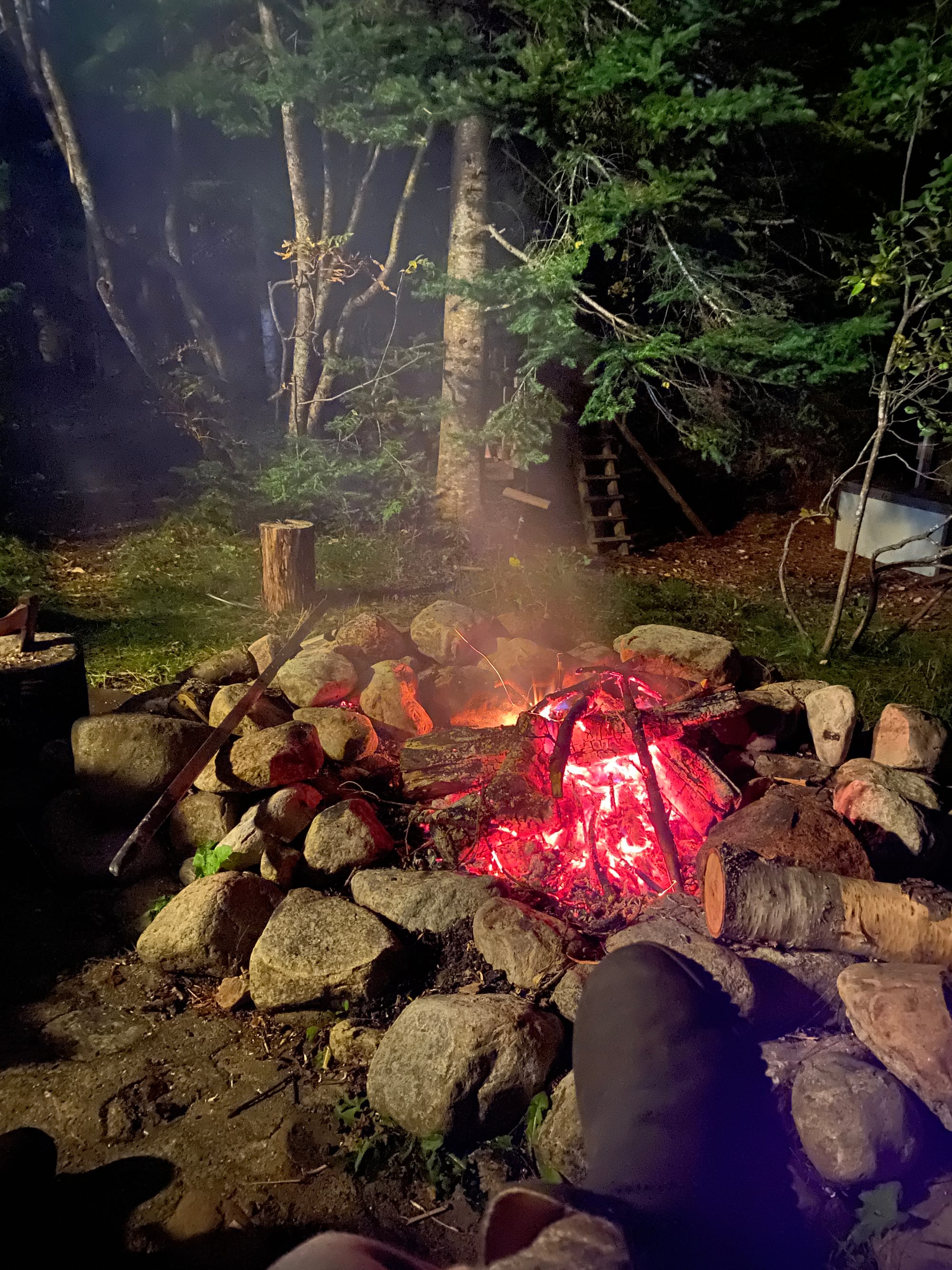
Back in June, it had been dangerously hot, everyone at the hospital was on edge, a man rammed himself into a parking space we’d been waiting for, screaming he’d been waiting longer. I asked Marc to just walk away, though steam was coming out of his ears, I said imagine the man is in a terror panic trying to get to someone who he loves in crisis inside, imagine we filled his window with bowers of goldenrod. Inside, we heard the Emergency Code White over the intercom multiple times, someone was violent somewhere, things were on the crackling edge.
Our woods aren’t built for heat like this, but at least it smelled beautiful with the last lilac trees in bloom. It was all green and evening, and the birds were singing and the air was thick like soup. I swam and the water felt off to me. It felt tacky between my fingers. Marc didn’t feel it, but I know now not to dismiss things that I might be imagining because I was right. Something was wrong. I had cancer. Ipso facto all my anxieties are true, something is wrong with the water, and in fact, at the end of the day when I’m tired, the whole world is on fire.
Later I wrote on a cancer forum:
“I’m angry at root causes these days and every article that is still pointing at individual choices like exercise or sitting still too much as a risk factor for cancer rather than digging into the systemic issues that are causing a rocketship increase in young people with death in their breasts is making me rage. I get that those things give readers who don’t have cancer some sense of control, but it’s like pouring salt on open wounds to imply that we, individual bodies now fighting for our lives, could have done much of anything to prevent this when the whole planet is dying for the same reasons we are. I am 3 weeks post blm, it’s 5am and I’m screaming into the void with you.”
In 2001 Barbara Ehrenreich, co-author of Witches, Midwives and Nurses wrote an essay called Welcome to Cancerland after she, too, was diagnosed with breast cancer.
She wrote:
It was feminist health activists who led the campaign, in the seventies and eighties, against the most savage form of breast-cancer surgery—the Halsted radical mastectomy, which removed chest muscle and lymph nodes as well as breast tissue and left women permanently disabled. It was the Women’s Health Movement that put a halt to the surgical practice, common in the seventies, of proceeding directly from biopsy to mastectomy without ever rousing the patient from anesthesia. More recently, feminist advocacy groups such as the San Francisco–based Breast Cancer Action and the Cambridge-based Women’s Community Cancer Project helped blow the whistle on “high-dose chemotherapy,” in which the bone marrow was removed prior to otherwise lethal doses of chemotherapy and later replaced—to no good effect, as it turned out. Like everyone else in the breast-cancer world, the feminists want a cure, but they even more ardently demand to know the cause or causes of the disease without which we will never have any means of prevention. “Bad” genes of the inherited variety are thought to account for fewer than 10 percent of breast cancers, and only 30 percent of women diagnosed with breast cancer have any known risk factor (such as delaying childbearing or the late onset of menopause) at all.
Bad lifestyle choices like a fatty diet have, after brief popularity with the medical profession, been largely ruled out. Hence suspicion should focus on environmental carcinogens, the feminists argue, such as plastics, pesticides (DDT and PCBs, for example, though banned in this country, are still used in many Third World sources of the produce we eat), and the industrial runoff in our ground water. No carcinogen has been linked definitely to human breast cancer yet, but many have been found to cause the disease in mice, and the inexorable increase of the disease in industrialized nations—about one percent a year between the 1950s and the 1990s—further hints at environmental factors, as does the fact that women migrants to industrialized countries quickly develop the same breast-cancer rates as those who are native born.
Ehrenreich wrote this over 20 years ago and not everything she said then still holds up. For one thing, that rate of about 1% increase per year continued for a while but then something else happened. According to a study led by researchers at Washington University School of Medicine in St. Louis:
After 2016, for reasons researchers do not yet understand, the trend line made a steep uphill turn, suddenly increasing at 3.76% per year… the most dramatic difference was a greater than 20% increased risk of breast cancer among women born in 1990 compared with women born in 1955.
My sister, Megan, a public health researcher born in 1990, called me one morning in the second week post-surgery and was lucky enough to find me weeping and terrified. I said:
“We all know these cancers are increasing because we poisoned the earth I mean we just know that in our bodies right? We didn’t start the fire and we can’t fucking escape it, it’s in our food, it’s in the pipes. Even us out here, vegans drinking water from a mountaintop lake, there are microplastics in the fucking falling snow and I want to know, are we at the crest of a wave of cancer patients, holding these poisons in our fatty tissues just like the whales in the st laurence seaway? The most prominent source of microplastics in our water supply comes from tires apparently, and every different ocean has its own garbage patch and they are hundreds of miles wide, and will this wave outpace the best we can do to change and will all our children die? Why don’t we know what causes it? Why is it so unfair? What the fuck is going on? Every other article is about how there’s micro plastics in rain and testicles and everything in between, then why don’t they stop making it for every goddamn useless thing? We’re dying. Mom remembers when plastic bags first appeared thinking “no, we don’t know how to get rid of this, this is bad.” That’s almost 50 years ago now, why can’t we see huge red flag? that’s where I feel my intuition imagination terror pinging, feeling like I’m someplace in a wave and I’d like to think it’s cresting, that we are the generation that pays for it but we’re also in the healing, maybe they will do it, follow the oily trails back and fight off the payoff and make regulations like the Montreal accord that healed the ozone layer, maybe it’s not just the start of huge collapse because the systems were too entrenched, didn’t love us enough. I’m so sorry to say all this to you when you have a human in you.”
And Megan, who is pregnant, who has lived in Burkina Faso and Haiti and Uganda and Panama working with women in isolated communities to learn what the gaps are in their health care and how systems can be designed, led by the caregivers on the ground, in the line of fire, to connect health care and community support to save their lives and the lives of their children, Megan who was my doula when May was born, who is gentle and hopeful in the face of all the things she’s seen, says:
“I think it’s kind of beautiful thing, that people keep fighting to improve things and you know, nothing is perfect. We’re still learning a lot, but most people want to do what’s best for their patients and that’s why they set up frameworks to make sure that’s at the heart of the treatments that are offered. Like the clinical trial standards are incredibly rigourous, you know, starting with animal trials, like the least sentient animal out there moving up to like you know one gorilla that’s it, we’re only willing to test one gorilla.
There has been terrible history, and it’s not to say that we won’t learn more in the future, but I take comfort from things like the Belmont report, a massive outline of ethical standards for the field that caused a groundswell of change. And though I sometimes disagree with health professionals I meet, I have to say I almost always feel in them a need to do no harm. To do the right thing. I’m thinking about the places where I work and I mean, I would be surprised if there were more than a handful of CT scanners in southern Africa, it is a privilege that we have access to that. I hope there’s a world coming where people do have access to earlier diagnosis for so many things, so we can help earlier, be less invasive, do less. It’s about resource equity, which is slow to change.”
As she spoke, I felt that other kind of fire from her, that steady one, the one that can sustain across the long durée of real change, and I felt the rage fire in me slowly changing form.
“I’m so angry.” I said, “and so tired, and my body hurts so much. But I do have faith in these circles of the sciences and caregivers and activists and amplifiers, passing their rituals forward, gathering knowledge such that it is replicable slowly, slowly over long time. It’s been so cruel and so flawed but I’ve seen the stats and read the tea leaves and divined from the charts and this is my best bet, I think. 8 rounds of dense dose chemo, 15 rounds of radiation. Slow brutal burning hopeful progress.”
On Sept 23, 2024 in Frontiers in Toxicology authors Lindsey V. Parkinson, Birgit Geueke, and Jane Muncke* published their findings that
Nearly 200 potential breast carcinogens have been detected in food contact materials (FCMs) on the market…When limiting these results to migration studies published in 2020–2022, 76 potential mammary carcinogens have been detected to migrate from food contact materials sold in markets across the globe, under realistic conditions of use. This implies that chronic exposure of the entire population to potential mammary carcinogens from food contact materials is the norm and highlights an important, but currently underappreciated opportunity for prevention. Reducing population-wide exposure to potential mammary carcinogens can be achieved by science-based policy amendments addressing the assessment and management of food contact chemicals.
My mom wasn’t paranoid, she was right. Something is wrong with this stuff.
Like Cathy Terkanian who knew her daughter’s body was buried in the backyard of the people who had adopted her, that she’d been murdered by the people who had sworn to give her a safe home, who in the documentary Into The Fire said of the rage the fueled her all the way to justice “I just need to get to the other side of this fire”, may we be fueled by rage and love on behalf of our children to get to the other side of this fire, this wave of avoidable death, this endless war.
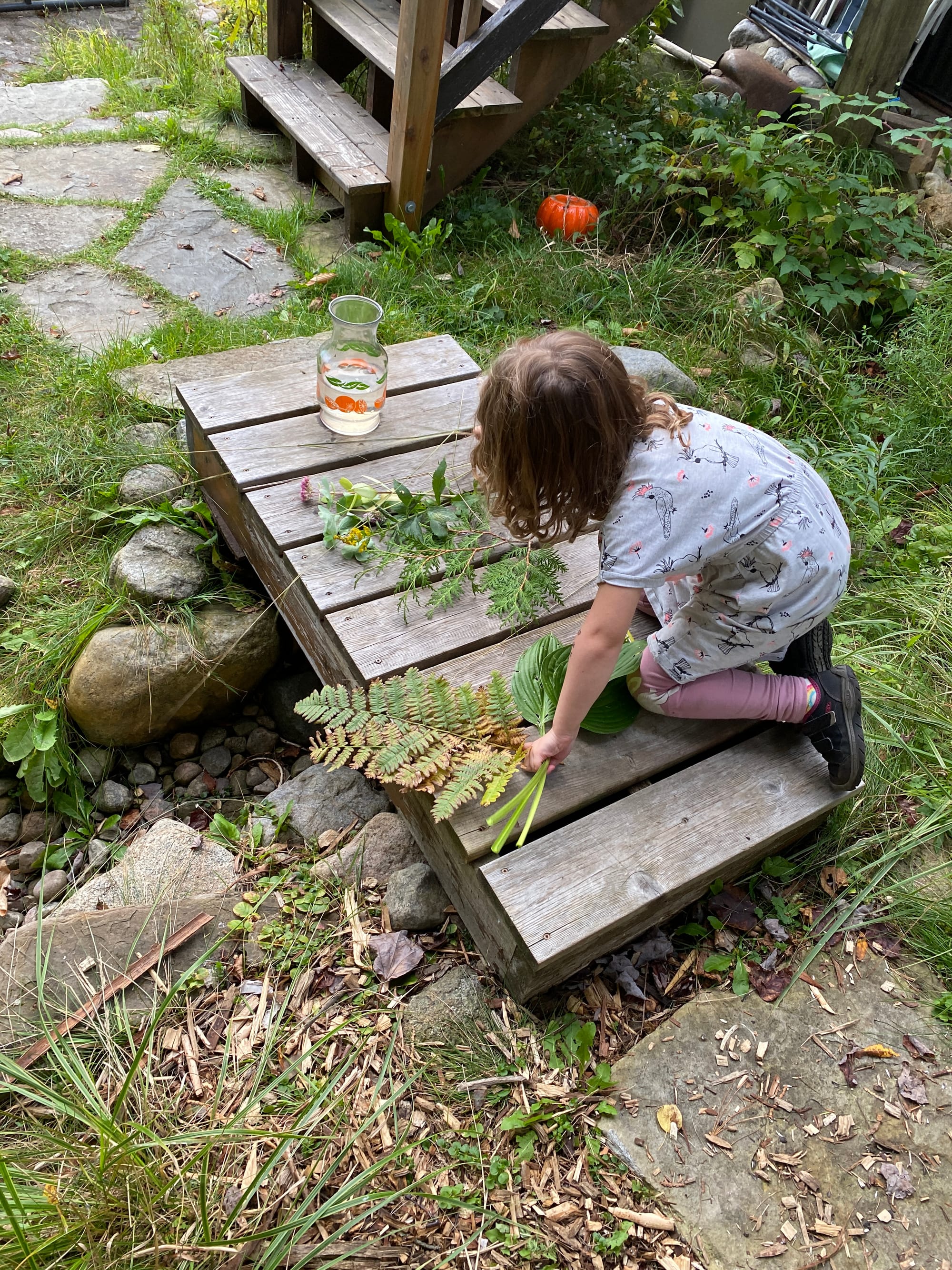
We decided we would tell May that what I had was called Cancer sometime before she went back to school in the fall, and sometime after I had my surgical drains removed, got to shower, sometime between urgencies when things felt ok again.
It was hard to believe that I would feel better but then one day, I did. Getting undressed to get into the shower and looking in the mirror for the first time I didn’t feel the nauseating dysmorphia. The stitches were healed to a gentle red and mostly hidden under the shadow line of my breasts and I’d been lucky to get to keep my nipples and the pain had finally burned itself out, there were lightningbolt moments of nerve pain sometimes, but they were rare and felt like a whisper of future-feeling returning, maybe?
So I suddenly felt weirdly good, and I opened the door from the bathroom into our tiny galley kitchen where Marc stood cooking dinner and said "Marc! Look at my boobs!" Because they were cute you know? More perky than they had been after two years of breastfeeding, that’s for sure, a little square around the edges but it was ok, in that moment. The day before May had cut my hair and Marc had buzzed it pretty short, this was weeks before it began to fall out, a moment of us feeling good, taking a tiny ounce of control over outcomes, and I kind of liked my new, tough, look. I didn’t feel like I would ever feel good again and then suddenly for a moment I did and all the prismatic coloured lights came shining back in. Marc was like “whoa dude, you’re a cute lady, sweet boobs!” And I danced around and was like ohohhhh, this is what trans theorists mean by gender euphoria. Like spinning in a dress that fluttered out perfectly on the dancefloor of my mom and stepdad’s wedding when I was 8 I was filled with the glee of being girl-me.
Can you call to mind a feeling like this, of being so in the right body, right place that it flickers with pleasure and joy? Can you hold that memory like a flame in your heart, like the flame over the fields? Can we use it to light torchlights of kindness for every single child, person, every single one deserving of that safe, delicious, full-bodied joy?
Every single child, person, every single one deserving of that safe, delicious, full-bodied joy.
Cancer took from me, is still taking, but two teams of skilled surgeons lining the sides of my bed under the blinding white lights, backed by hundreds and thousands of researchers and patients and activists and ancestors gave me this back: this shiver of pleasure in my own weird skin, feeling like a sexy cyborg, colour back in my cheeks, suddenly able to digest food again after two years of losing weight and being exhausted, swaying my hips like a small fire in the basket of myself was crackling to life again.
So I knew it was time to tell her. At that time May knew everything but the word, and we’d been careful to introduce the idea that cancer could be many things before telling her that’s what was in me. Because before that, all she knew was cancer was a death that came suddenly taking her beloved best friend grandmother. But cancer was also a quick surgery on her uncle’s skin, all better; a character in one of her favourite graphic novels who lost her leg to cancer years before but is at Comicon now, falling in young love. By the time we told her the word she wasn’t bothered by it, she said “ever since the surgery is done I’m not scared.”
But kids and adults, we think we’re fine but things move slow and ancient through our subconscious. You have to watch a forest for days after you think a fire is out because it smolders in the leaves and deep in the soil.
That night was the first night I was able to do her bedtime rituals after surgery. I met her at the bottom of the stairs wearing the red, long-sleeved nightgown printed with flamingos in santa hats that exactly matches her favourite nightdress. We’d found it in a thrift store and since she was wearing her one every day no matter the season we figured we’d get it even though it was a size 12, she’d grow into it, but then she’d convinced my sister to try it on, and then me. This was months before my diagnosis and she’d been so delighted by it: “Mom your boobs look so cute!” so I put it on again for our post-surgery, grand reunion bedtime.
With 200ml of saline in my expanders and a sports bra, my boobs did look cute again, some weird angles, but I thought it’d be ok, and it was, she was so excited and also so careful with me in a way that I was grateful for but wished she didn’t have to be. We were talking about something and she said “we didn’t even know you’d have surgery then!”
And I said “yah, that’s so weird that we didn’t know what would happen next. We know a little bit about what will happen next now, do you want to know?”
May said “No. I mean yes.”
I said, “In a couple of weeks, once you’re back in school, I’ll start to have to go to these appointments where I’ll have to sit still for a long time and get a red medicine from a needle in my arm.”
She said, “That’s ok I don’t mind needles they don’t even hurt me.”
She was unfortunately experienced at needles. I nodded and continued, “And I’m going to have days when I feel good and then sometimes I’m going to have days when I’m tired and I feel sick because the medicine is really strong.”
“Ok” May said, “I’m going to get you a bucket of skittles, oh no wait I’m going to go back to that store at the campground where we saw those candy rings and we’ll each have a candy ring and watch TV when you have a bad day.”
And I should have just said “Amazing.” But sometimes the feeling comes like you have to warn them, and then you scare them when you’re really trying to help them prepare. And I said “There might be days I feel too sick for candy and I just need to sleep.”
Her eyes got wide, and she looked away in a way she does when she wants to leap out of the current moment.
“Let’s just read now” she said, tucking in next to me gently. Not as close as either of us wanted to be.
After we turned out the light she put her tiny palm to my face and I put a kiss in it and and she kept it there and said keep going, and I knew she was remembering when she’d been even little-er and I’d take her hand and kiss it over and over and tell her I was filling it up so she had them all day. So I smooched and smooched her tiny hand as she laughed and we yawned and she fell asleep.
That night I lay in my bed in the dark and felt the weight of the rain in the air, there was a red warning on our phones telling us to expect record fall as we caught the edge of Hurricane Debbie.
I felt in that weight the terror of all the children under fire, all their parents trying to shield them from the worst of it, to tell them stories about safety, to fill their palms with magic protective kisses, to throw their bodies over them when the roof comes down in flames, I woke in a dark panic, choking like there wasn’t enough air in the room and Marc followed me as I stormed half asleep around the dark house up to the porch to gasp in the breathing wind of rain finally falling.
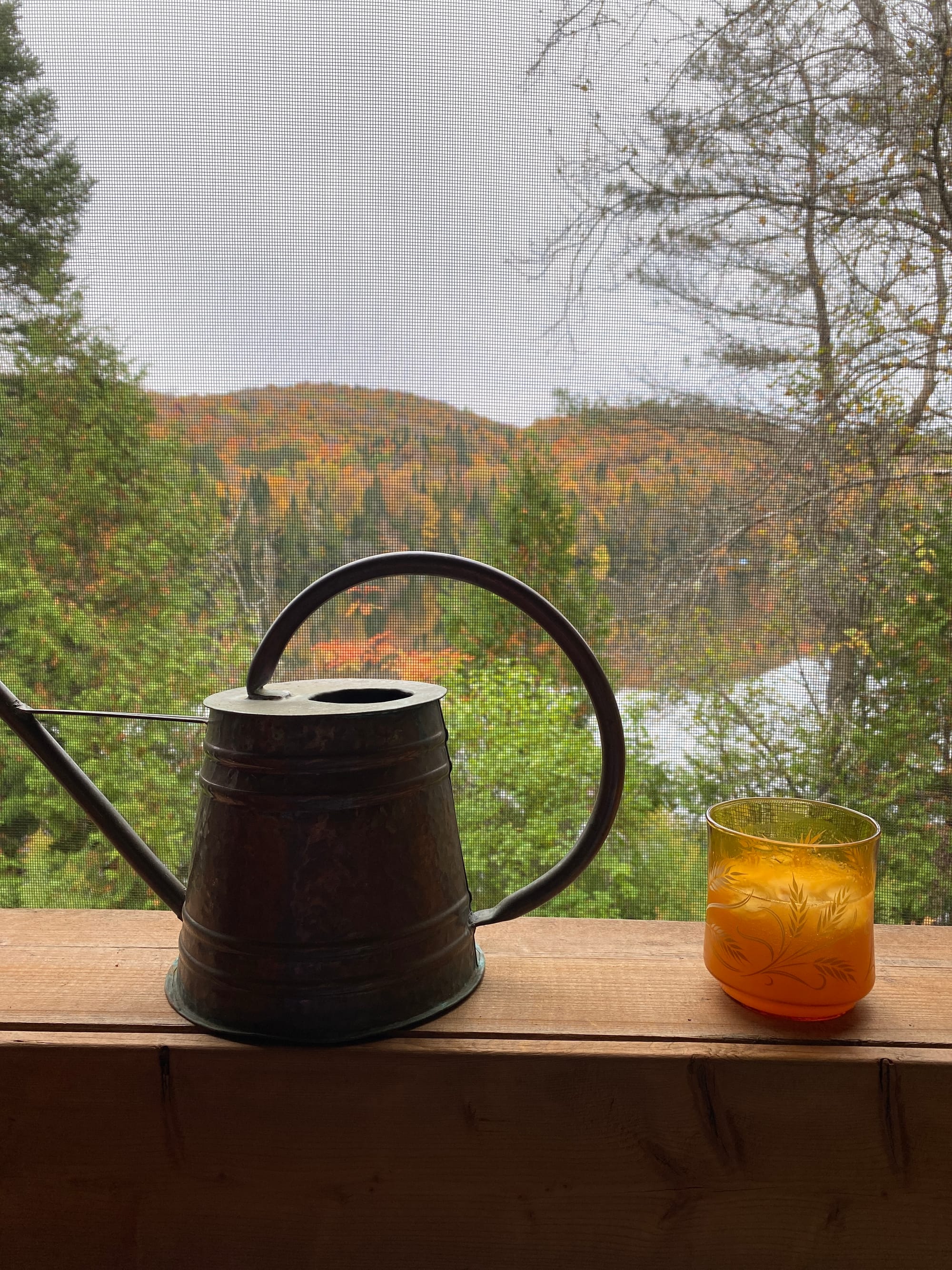
May woke up too, and Marc tried to be the one to help her fall back asleep but her cries ramped up the spiralling ladder of hysteria “No, it was supposed to be Mom this time!” So I made my way to her.
And I lay down with her and Marc lay down on the other side and she clung to me though I couldn’t turn and hold her, my movement was still limited by bands of pain across my chest that kept me in place. When she started to talk about quesadillas I knew she was asleep. I stayed all night long so I would be there when she woke.
The next morning we played for hours as the rain fell but when I said I might need to go lie down she fell apart and it turned into a repeated screaming sobbing demand for TV or candy. We tried to find a couple ways out of those collapsing bridges and what finally worked was playing with fire.
I stopped trying to help or offering to hold her and instead asked, “What do you think might help?” and, ok, first she said “Tv” and next she said “candy” but then she said “deep breaths?” And I said “oh! Deep breaths? How would that work?”
“You know, you’re always telling me to take deep breaths?”
“Oh yah! How could we do it? Like blowing out candles?” And what I meant was this little exercise where you pretend your fingers are candles and she blows them out, but she lit up and clamboured off the couch and I followed her, new little jolt of joy moving through the house. She climbed up on the old gas fireplace that still sat fat in our living room though we didn’t use it anymore.
“It’s time to finally use these candles” she said pulling down these small, dark beeswax candles she had chosen as a treasure from the booth next to Marc’s at an artisan market fundraiser for her school back in the fall. She had refused to light them for a long time.
She also pulled down a candle that was actually two tall beeswax candles that must have been twisted together when they were soft and hanging from a shared wick. “It’s time to light these too.” In the end she found 5 candles around the house, one with a fat wooden wick in a low bowl, two little tea lights almost burnt out, and we took them out on the porch where we could hear the rain.
She ran and got the lighters too. She knows where there’s a ceramic goblet full of brightly coloured Bicks on the counter behind the stove, and she knows how to pull a chair up and reach them. She brought them over and I lit a candle and she blew it out and asked me to light it again and blew it out and asked me to light it again and I said well we have to take a little time in between it gets hot. it’s burning my fingers, take a deep breath into your nose and out through your mouth to blow it out.
Oh I said do you know what a square is? Yeah she said, and drew it in the air.
I said OK so let’s breathe in on the count of 4 to draw the up, and then hold it full for four to draw across the top, and then breathe out for four to draw the down, and then hold it empty for four to complete the square, and then blow out the candle again.
And we breathed and drew the square. She lay her head on the table with her little eyes closed for just a sec and then she blew it out.
I said do you remember the four elements? What if we imagine we draw the square with those elements, like what breathing in be? And she said fire, I said oh yeah that makes sense, I like the idea of being crackling full of fire, like inside you, there’s a little fire and it never goes out, when you pull up with air then the little fire is strong. What if holding at the top is Air, the bottom is Earth, and breathing out is like water running out and taking anything we don’t need away? She said ok, ok light the candle again, and so we did, and we breathed like that for awhile.
Then she set up the rest of the candles in a square with one in the middle and she said let’s pretend it’s my birthday. Birthday candles are old delicious magic and I laughed and said of course, of course it’s your birthday and you should make a wish and blow out the candles. We lit them and sang happy birthday I said make a wish! Make a good wish and blow out the candles and and she did it and she said let’s do it again!
And I said OK this time let’s imagine that every one of your ancestors and every one of your friends and all of their cats and dogs and snakes and birds, everyone who has ever loved you ever is all around you and they’re all singing happy birthday and she said awww OK! And we lit the candle and sang happy birthday to you… and she beamed and I said make a wish! And she blew out the candle and said: again!
I said ok this time let’s imagine all those people are here for your birthday party again but they are little kids! And she said AWWWW and I said even poppa is a little kid!!! And she said AW SO CUTE!!! And we lit the candles and sang Happy Birthday and I said make a wish! And she closed her eyes smiling and blew out the candle.
And I said what should we imagine now?
And she said Babies!
I said Oh! They’re tiny babies! Yah! She cheered. And we’re holding them! You’re holding me as a tiny baby and I’m holding you! And she got very tender looking and said yes. I said you’re taking good care of me and she said yes. And gave me a big hug.
And we lit the candles, and I sang her happy birthday, and she rocked me as a tiny baby and I rocked her as a tiny baby and she made a wish, and blew out the candle.
And I said one more?
Ok she said.
What should it be?
Just now.
We’re back here right now in the present, and it’s us?
Yah.
Perfect I said, and I lit the candle. And I sang her happy birthday. And she made a wish and blew it out.
And I tried not to wonder if she was storing up happy birthdays like she was storing up kisses, just in case.
You’re holding me as a tiny baby and I’m holding you.
June Jordan wrote:
I SAID I LOVED YOU AND I WANTED
GENOCIDE TO STOP
I SAID I LOVED YOU AND I WANTED AFFIRMATIVE
ACTION AND REACTION
I SAID I LOVED YOU AND I WANTED MUSIC
OUT THE WINDOWS
I SAID I LOVED YOU AND I WANTED
NOBODY THIRST AND NOBODY
NOBODY COLD
I SAID I LOVED YOU AND I WANTED I WANTED
JUSTICE UNDER MY NOSE
I SAID I LOVED YOU AND I WANTED
BOUNDARIES TO DISAPPEAR
And that’s how we felt then, I love you and I want cancer to stop, genocide to stop, earth poison to stop. I love you and I want justice for every earth being, every child, every flickering bit of love that remains.
We look to our elders to demonstrate another way of being in this broken world, another way of extending our circle of commitment to the person in front of us, or to a group of people, like she did with Palestinian people. June taught us it is important to practice self-love, and to show commitment to your community as well as to extend that care to those struggling for justice around the world. We don’t need to choose between caring for ourselves and caring for the world. There is no dichotomy or inconsistency in this orientation to the world. And and both. Jordan gave us that.
The fire in us is love and rage, and, and both,
"I love you and I want nobody thirst and nobody cold."
Let’s jump through the burning bush right at the centre of binaries and call forth with our love something brand new.
June wrote:
YOU SAY YOU LOVE ME
AND I HAVE BEGUN
I BEGIN TO BELIEVE MAYBE
MAYBE YOU DO
I AM TASTING MYSELF
IN THE MOUTH OF THE SUN
She is that flame above the beauty in the fields now.
May she rest in power.
In the mouth of the Sun.
And Blessed Fucking be.
